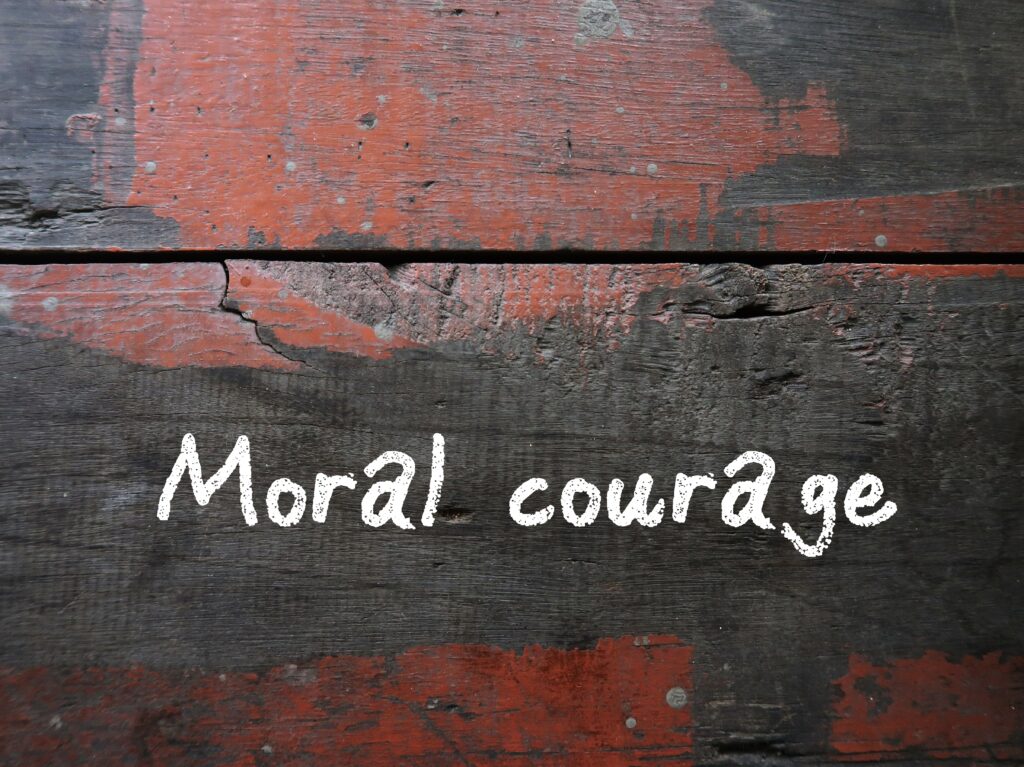When I sit with clients in the therapy room, one of the things I notice quite often is that trauma is rarely just about what happened – it’s also about what it means to that person. How trauma impacts every individual is different – and that has to be honored. People can experience similar childhood trauma, have professional careers where they are continually exposed to violence, or experience the same catastrophic event, and each individual is impacted differently.
The nervous system remembers danger, threat, and fear. That’s why trauma therapy often focuses on symptoms like hypervigilance, intrusive memories, or the way the body goes into fight, flight, fawn or freeze. But there’s another layer of suffering I’ve witnessed again and again: the pain that comes from feeling like one’s deepest values or moral compass has been broken. People start questioning, “Why did this happen to me?” or “How could this possibly even happen to someone?”
This is what we refer to as moral injury. And in my experience, it is one of the most important – yet often overlooked – pieces of trauma treatment.
What Is Moral Injury?

It is the wound that occurs when we violate- or are forced to live in contradiction with our deepest values. It’s the pain of betraying one’s own conscience, or of being betrayed by others in situations where trust and integrity were essential. I’ve seen it in survivors of abuse who feel betrayed by people they trusted, in healthcare workers who had to make impossible decisions during the pandemic, and in first responders who witnessed events they wish they could unsee.
Clients describe it to me in words like:
- “How could someone I loved and trusted do this to me?”
- “I know I survived, but I don’t recognize myself anymore.”
- “I should have done something, but I ran away.”
- “I feel filthy by what happened.”
Where PTSD often centers on fear, moral injury is more about guilt, shame, and betrayal.
Moral Injury and PTSD: Why the Distinction Matters
In trauma therapy, we talk a lot about PTSD. And for good reason – PTSD can be devastating and requires careful, evidence-based treatments and a well-informed trauma therapist. But what I’ve noticed is that some clients can go through treatment for PTSD – whether it is EMDR, ART, somatic therapies, or cognitive work (such as Cognitive Processing Therapy) – and still feel profoundly broken inside. That’s because PTSD and moral injury are not the same thing. That’s why Complex PTSD is essential to consider when it sounds like moral injury has occurred. Complex PTSD helps capture moral injury better than PTSD.
PTSD arises when the nervous system is overwhelmed by fear and helplessness. Moral injury arises when the soul is overwhelmed by betrayal, shame, or ethical conflict.
 For example:
For example:
A child may heal from the fear of physical abuse but still wrestle with the moral injury of being betrayed by a parent who was supposed to protect them.
A veteran might carry PTSD from surviving an ambush, but the moral injury comes from remembering the moment he ordered fire that harmed civilians.
A nurse may not have nightmares about the ICU during COVID, but she may lie awake every night agonizing over the patients she couldn’t save because resources ran out.
This distinction matters because healing fear is not the same as healing guilt or betrayal. If I only help someone calm their nervous system but never address the shattered meaning, they may leave therapy still feeling fundamentally damaged.
Why Moral Injury Belongs at the Center of Trauma Work
Most of the time, human beings live by a moral compass. We don’t just want to survive; we want to live in alignment with our values. When trauma pulls us out of alignment – when it forces us to act against our conscience, or reveals the betrayal of someone we trusted – the wound can be deeper than fear. These wounds should be explored with clients who feel this may be an essential part of their healing.
Naming the Wound Can Bring Relief
Some of my clients have never heard the term “moral injury” until I introduced it. When I do, something softens. They realize that their pain isn’t just about weakness, depression, or pathology—it’s about being human. Naming moral injury gives people a framework that validates what they’ve been feeling all along.
I’ve worked with clients who have successfully reduced their PTSD symptoms—fewer flashbacks, better sleep, less anxiety – but still describe themselves as hollow, ashamed, or irreparably broken. Once we begin addressing the moral dimension of their trauma, healing feels more complete.
How I Work with Moral Injury in the Therapy Room
1. Creating Space for Moral Pain
The first step is always safety – creating an environment where clients feel they can speak the unspeakable. Many people carry enormous shame and fear around sharing their stories of moral injury. They worry I’ll judge them or confirm their worst fears about themselves.
2. Exploring Guilt and Shame
I often help clients tease apart guilt (“I did something wrong”) from shame (“I am something wrong”). Guilt, when appropriate, can be adaptive – it signals our values. Shame can corrode the self. The work is about taking responsibility where it’s due, and compassionately releasing the self-condemnation that keeps people stuck.

3. Inviting Self-Compassion and Forgiveness
Forgiveness is one of the hardest – and most liberating – parts of healing moral injury. Sometimes forgiveness begins with simply recognizing the impossible circumstances people faced. Sometimes it’s about helping survivors realize that their freeze or dissociation was a nervous system response, not a moral failure. Practices such as self-compassion meditation, journaling, or placing a hand over the heart while acknowledging suffering can be powerful starting points.
4. Rebuilding Trust and Connection
Because moral injury often involves betrayal, healing may include relationships. This may mean repairing relationships in one’s personal life, but often it begins with the therapeutic relationship itself. Over time, group therapy, peer support, or spiritual communities can also be essential in restoring trust.
5. Meaning-Making and Spiritual Healing
Many clients find that moral injury shakes the very foundations of their worldview, raising questions about God, the Universe, or the purpose of life. In my practice, I welcome these conversations. For some, this means connecting with a faith leader or spiritual community; for others, it’s about redefining meaning in secular or existential terms.
Healing doesn’t necessarily mean returning to the old worldview. It often means building a new one that can hold the complexity of what they’ve lived through.
6. Rituals of Repair
Healing moral injury sometimes requires symbolic acts of acknowledgment or repair. I’ve seen veterans create rituals of remembrance, healthcare workers participate in collective memorials, and survivors of abuse reclaim their stories through writing or ceremony. Rituals help externalize grief, allowing for a sense of release and reconnection.
Why This Matters for the Future of Trauma Therapy
The more I practice, the more convinced I am that trauma treatment must address moral injury. Healing is not just about calming the body and quieting intrusive memories – it’s about restoring integrity, meaning, and connection. When we incorporate moral injury into our work, therapy becomes more than just symptom management. It becomes an opportunity for profound transformation:

- Reconnecting people with their values.
- Helping them release shame and reclaim dignity.
- Supporting them in building lives that feel aligned, authentic, and meaningful again.
Moral injury matters because it reminds us that trauma is not only psychological – it’s moral, existential, spiritual and deeply human.
As a therapist, I see it as important work to sit with someone’s moral pain without judgment, to help them find compassion for themselves, and to witness the slow reweaving of their moral fabric. Healing is possible. Not by erasing the past, but by integrating it.
Are you looking for trauma treatment that includes moral injury as part of the therapeutic approach? Please book a phone consult to learn more about moral injury and the different trauma-based therapies I offer.


